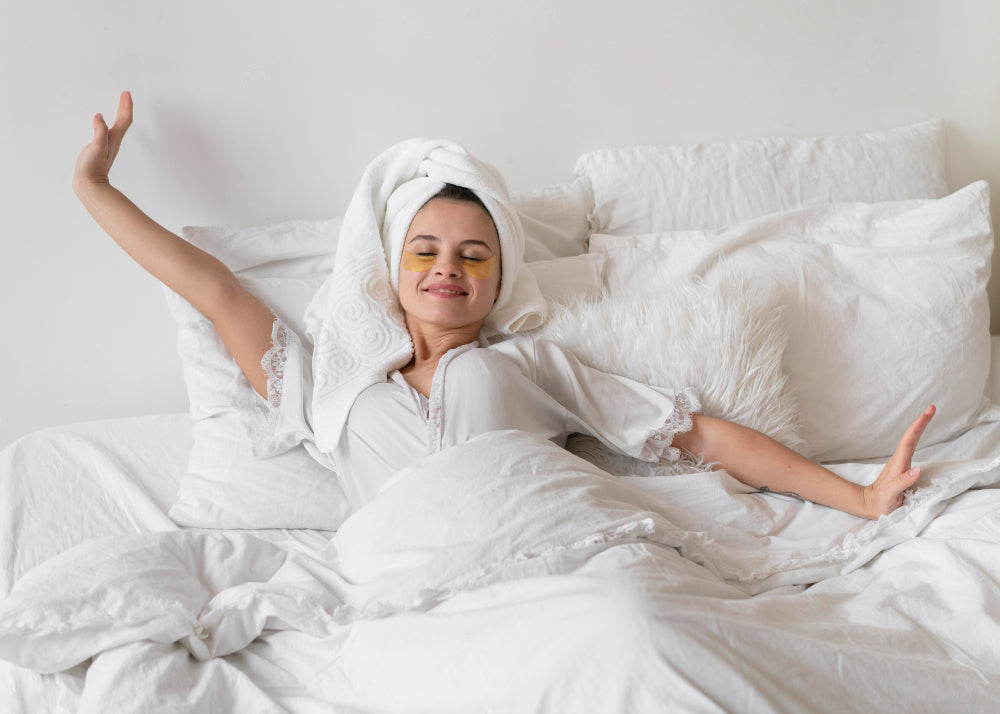
Sleep Hygiene Tips for Menopause: Your Nighttime Reset Plan
When sleep goes sideways during perimenopause and postmenopause, it’s not just annoying—it’s life-disrupting. Between night sweats, mood swings, and a racing mind, it’s no wonder many of us are tossing, turning, or waking up at 3 a.m. for no good reason. But here’s the good news: tweaking your sleep hygiene can make a real difference.
Sleep hygiene isn't about perfection—it’s about creating an environment and routine that supports your body’s need to rest, repair, and recharge.
Create a Sleep-Friendly Environment
Let’s start with your sleep setting—it matters more than you think.
-
Keep it Cool: Aim for around 18°C (65°F). Cooling fans, breathable sheets, and techy cooling mattresses can help reduce those sweaty wake-ups.
-
Block the Light and Noise: Blackout curtains, eye masks, white noise machines, or good old-fashioned earplugs can help create calm.
-
Choose Breathable Bedding: Cotton or moisture-wicking fabrics for sheets and pyjamas help regulate temperature and comfort.
-
Bedroom = Sleep + Sex Only: Keep work, doomscrolling, and late-night snacking out of the bedroom. This trains your brain to associate the bed with rest—not stress.
Set a Consistent Routine
Your body loves rhythm. Give it one.
-
Same Sleep, Same Wake: Go to bed and wake up at the same time every day—even on weekends.
-
Relax Before Bed: Wind down with a warm bath, meditation, journaling, or a few chapters of a good (non-scary) book. Keep it tech-free.
Manage Diet and Hydration
What you eat and drink plays into how you sleep.
-
Limit Caffeine and Alcohol: Especially after 2 p.m. They’re notorious for disrupting sleep and worsening hot flashes.
-
Eat Light at Night: Heavy, spicy, or acidic meals close to bedtime can trigger reflux and restless nights.
-
Hydrate Smartly: Drink water steadily throughout the day, but ease off an hour or two before bed to avoid nighttime bathroom trips.
Light: Your Body’s Sleep Timer
Light exposure can reset or ruin your internal clock.
-
Morning Sunshine: Get 15–30 minutes of daylight early in the day to help regulate melatonin and boost your energy.
-
Limit Blue Light at Night: Power down screens 1–2 hours before bed. If you must scroll, try blue light-blocking glasses and dimmed settings.
Move Your Body
Exercise improves sleep—just don’t overdo it at bedtime.
-
Get Active: Aim for moderate aerobic activity or strength training during the day.
-
Timing Matters: Avoid intense workouts right before bed—they can spike your energy when you’re trying to wind down.
Bonus: Hello Pause Sleep Kit
Need a little extra help? Our Hello Pause Sleep Kit is curated to help menopausal women like you sleep better. Think soothing bedtime rituals, cooling comfort, and hormone-friendly tools to ease you into dreamland. Check it out here if you’re ready to reset your nights with intention and care.
Final Word
Better sleep in menopause isn’t a fantasy—it’s a process. With the right environment, routine, and support, your nights can feel restorative again. So dim the lights, turn the fan on, and give yourself the bedtime routine you deserve.
Sleep, like everything else during menopause, might take a little extra love—but you’re absolutely worth it.
